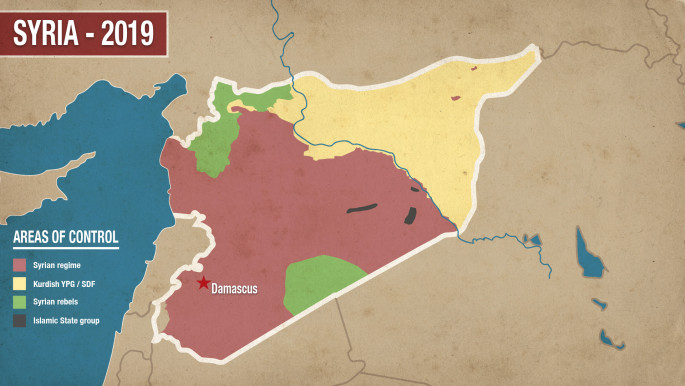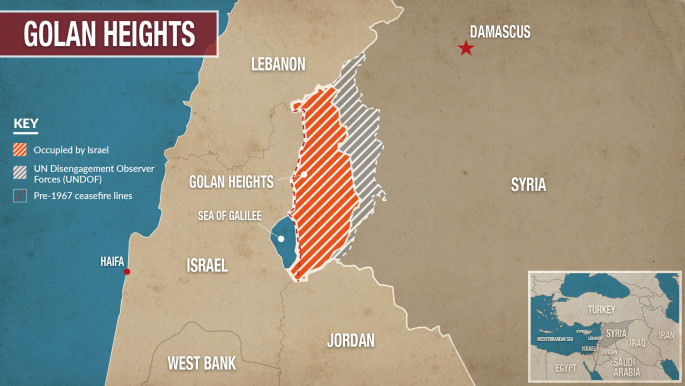Syria Weekly: The Golan Heights becomes a new propaganda battle for Israel and Syria's regime
Israel's grip on the Golan not only provides it with a significant strategic advantage over its neighbour, but also a rich supply of natural resources.
The final territorial battle against the Islamic State group ended over the weekend, bringing an end to the extremists' self-declared caliphate. Analysts say the battle against IS itself is far from over, however, with thousands of militants and sympathisers believed to be hiding out in Syria and Iraq, waiting for the emergence of IS 2.0.
Golan lows
Rumours that the US was poised to formally recognise Israel's illegal annexation of Golan Heights crystallised in recent weeks after the State Department altered the wording of the status of the Syrian territories from "occupied" to "controlled" in a human rights report. This was followed by President Donald Trump on Friday tweeting that it was time for the US to "recognise Israel's sovereignty" over the Golan Heights.
Trump's erratic tweets on foreign policy issues are often a precursor for official government doctrine and so it appeared inevitable that Washington would formally endorse Israeli "custodianship" over the Syrian Golan territories.
On Sunday, Foreign Minister Yisrael Katz said Trump would sign a declaration recognising Israel's claims to the Syrian land. There were loud noises from Damascus, protests from the Golan's Syrian Druze population, and bluster from Bashar al-Assad that Syria would one day "reclaim" its territories.
Syria's Golan Heights have been described as Israel's quietest front, due to the relative peace on the frontier since the last major war with Syria in 1973 and UN supervision on part of the land. Having being seized by Israel in the 1967 war and effectively annexed by Israel in 1981 - a move not recognised by the rest of the world - reclaiming the territories has been a key aim of the Syrian regime for the past 40 years - although neither Hafez nor Bashar al-Assad have seriously considered a military option due to the vast disequilibrium in Israel's favour.
Instead, there was a focus on secret peace talks between the two sides during the latter days of Hafez's rule, with the possibility of a "land for peace" deal. Urban legend has it that the agreement fell through when Hafez insisted he wanted to "dip his feet in the Sea of Galilee", and Israel was completely unwilling to accept Damascus having even limited access to inland water, as they did before the 1967 war.
 |
Occupation of the Golan Heights gives Israel a key strategic bonus over its neighbours.
Israeli artillery has a high vantage point over Syria, while Damascus lies just 60km from the Golan front. This is something Israel likes to remind its neighbour with a directional sign at a Golan tourist spot pointing towards the Syrian capital.
"Whoever controls the Golan controls the Middle East," one Israel analyst wrote, and Israel would be unlikely to give the territories away without extracting a heavy price. Israel has reinforced the occupied territory with settlers and military hardware to bolster its illegal claims to the land.
Syria's war brought fresh fears in Israel that clashes could spill over into the Israeli-occupied side of the Golan, although almost all the fighting has been between regime and rebel fighters. Israel has carried out numerous strikes in southwestern Syria to prevent Assad's backer, Iran, from establishing a new front close to the Golan or arms being funnelled to Hizballah.
No less important are the resources that the Golan could hold. Much of Israel's water supplies come from the nearby Sea of Galilee, with desalinated water being pumped in to replenish the freshwater lake. Israel has also granted energy companies rights to drill for oil, including Genie Energy which includes former US vice President Dick Cheney as a board member.
 |
In recent years there has been talk of rich reserves lying beneath the occupied land, although these claims have been contested by some energy experts and extracting resources might prove costly and possibly contaminate vital water supplies.
The main obstacle, however, to extraction has been Israel’s status as an occupier of this land, which would make it illegal to export the oil.
Even after Trump hinted at formal recognition of Israeli claims to land, Washington's allies - including the EU, Jordan and Turkey - have been quick to state they still consider it to be occupied Syrian territory. Some have suggested that Trump's Golan move could pave way for Washington backing Israel's annexation of the West Bank, ahead of the president's so-called "Deal of the Century".
Settlers in the occupied territories will likely attempt to pressure Prime Minister Binyamin Netanyahu to press Trump on the issue, particularly if he forms a new coalition government with far-right parties.
End of the caliphate
The Islamic State group's last territorial outpost fell on Saturday, when Baghouz was captured by Syrian Democratic Forces after a weeks-long battle against the militants. The offensive was slowed down by the thousands of civilians trapped in the village and an annexed camp lying on the banks of the Euphrates.
For days, tens of thousands of ragged fighters and distressed civilians left Baghouz, while an unknown number stayed behind to fight. Footage from Baghouz in the final days of the battle showed women firing Kalashnikovs from ditches at the Arab-Kurdish forces fighting to take the town.
The battlefield has been pockmarked with dog holes, collapsed tents, and sleeping bags strewn across the wasteland.
The final bombardments of the battle obliterated the camp leaving only dead bodies, burned out vehicles and shredded blankets. Syrian activists on social media alleged a massacre had taken place and that SDF had enforced a media blackout. The Syrian Observatory for Human Rights said 200 IS fighters and their families died in the assault.
Images shared on social media by activists from Baghouz appeared to show piles of bodies, with children among the survivors suffering horrendous burns.
Paul McLoughlin is a news editor at The New Arab. Follow him on Twitter here.







 Follow the Middle East's top stories in English at The New Arab on Google News
Follow the Middle East's top stories in English at The New Arab on Google News


